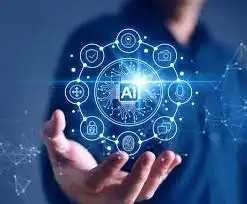The AI Revolution: Why Generative AI is the Real Game ChangerThe AI Revolution: Why Generative AI is the Real Game Changer
If you've been on the internet (or, let's be real, just existing in the world) anytime in the last year or so, you've probably heard the buzz. Artificial Intelligence is everywhere. From chatbots that sound eerily human to images that defy reality, it feels like we woke up one morning and AI just… blew up. But here's the thing: AI isn't new. It's been cooking for decades. What is new, and what's truly sparked this wildfire of adoption, is something called Generative AI. It’s like the final piece of the puzzle that has unlocked an explosion of creativity and complex predictions, making AI accessible and frankly, a bit mind-blowing, for everyone.The Grand Design: What Even *Is* AI?
Let's start at the very top of the family tree. Artificial Intelligence, or AI, is the grand overarching dream. Think of it as the ultimate goal: to make machines smart, capable of performing tasks that typically require human intelligence. This includes everything from problem-solving and understanding language to perception and decision-making. For a long time, AI was a bit of a sci-fi concept, something we saw in movies but rarely in our daily lives beyond a glorified calculator.Learning the Ropes: Enter Machine Learning
Then came Machine Learning (ML), which is a really important subset of AI. If AI is the grand vision, ML is the practical pathway to get there. Instead of explicitly programming a computer for every single task, ML focuses on teaching machines to learn from data. Imagine showing a kid a million pictures of cats and dogs, and eventually, they learn to tell the difference themselves. That's ML in a nutshell. Algorithms gobble up vast amounts of data, spot patterns, and make predictions or decisions without being told step-by-step how to do it. This is how your streaming service recommends movies or your email flags spam. It’s pretty cool, and it laid the groundwork for the next big leap.Getting Deep: The Magic of Neural Networks
Building on ML, we dive into Deep Learning (DL). This is a subset of Machine Learning that really supercharged what computers could do. Deep Learning uses something called neural networks, which are structures inspired by the human brain. These networks have multiple layers (hence "deep") that process information hierarchically. Each layer extracts a different level of features from the input data – like pixels forming edges, then edges forming shapes, then shapes forming objects. This allows DL to handle incredibly complex data like images, speech, and video with unprecedented accuracy. Think facial recognition on your phone or those impressive voice assistants – that’s often Deep Learning at work. It’s what gave AI the eyes and ears it needed to really level up.The Creative Spark: Welcome Generative AI
And now, for the main event: Generative AI (GenAI). This is the new kid on the block, and boy, has it made an entrance! GenAI isn't just about recognizing patterns or making predictions based on existing data; it’s about *creating* something entirely new. It’s a subset of Deep Learning, often leveraging massive "foundation models" trained on mind-boggling amounts of data. The most famous of these are Large Language Models (LLMs), which can understand, generate, and manipulate human language in ways that still feel like magic. This is where things get wild. GenAI can write essays, compose music, generate hyper-realistic images from a few words, design blueprints, or even create compelling video content. Remember those chatbots that used to feel clunky and robotic? Now, thanks to GenAI, they can hold conversations that are incredibly natural and informative. And yes, it’s also the technology behind things like deepfakes – showing just how powerful and, at times, ethically tricky, this creation capability can be.Why the Hype Now? The GenAI Effect
So, why has Generative AI caused this seismic shift in AI's adoption? Well, for starters, it's incredibly accessible. You don't need to be a coding wizard to use it; you just type in a prompt. This user-friendliness has put the power of AI into millions of hands overnight. Suddenly, people who never thought about AI are using it for brainstorming, writing emails, designing logos, or even just having a bit of fun. Secondly, its ability to create new content is a true game-changer. Historically, AI was largely analytical. It would tell you what was there, predict what might happen, or classify things. GenAI flips the script, becoming a creative partner. It doesn't just process information; it synthesizes it into original output. This means artists, writers, marketers, developers, and even casual users can now leverage AI to augment their creativity and productivity in ways that were unimaginable just a few years ago. Furthermore, these foundation models, particularly LLMs, have demonstrated an astonishing capacity for complex reasoning and prediction. They can summarize dense documents, translate between languages with nuance, and even help debug code – tasks that require a deep understanding of context and subtle patterns. This combination of creation and sophisticated reasoning has transformed AI from a specialized tool into a mainstream utility, driving its exponential adoption across every sector imaginable. We're just beginning to scratch the surface of what Generative AI can do. It's not just a technological advancement; it's a cultural phenomenon, redefining how we interact with information and creativity. We're riding a wave that’s changing everything, from the way we work to the way we learn, all thanks to AI learning not just to understand, but to imagine and create. 


